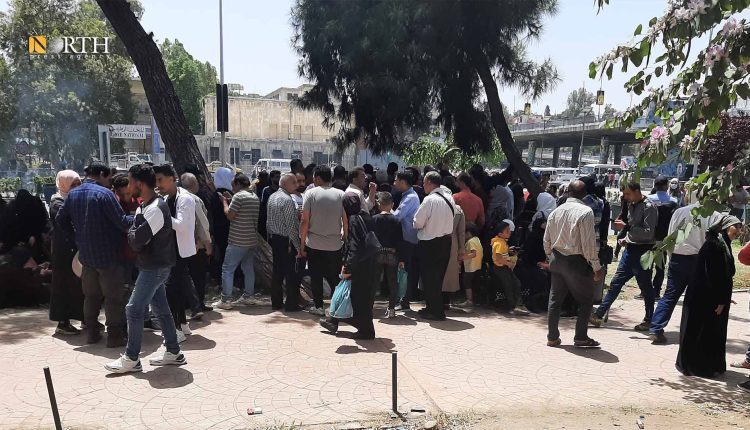
DARAA/SUWAYDA, Syria (North Press) – A former political detainee from Suwayda Governorate in southern Syria recalls the days he spent inside Saydnaya prison under affiliation to leftist parties.
Although it is years since he left the prison, his memory is daunted with those dark days he spent at the Saydnaya prison. How could he forget nearly 25 years he spent in the prison? This is the story of a former political detainee who spoke to North Press on the condition of anonymity.
“I was released in 2013 after cells became replete with Syrians. The tragedy inside Saydnaya is repeated for a new generation having new ideas facing with torture.
Following minutes of silence, he recalled those years pregnant with torture, “Even if the war terminates, and the state imposes political reconciliations, war is going to proceed in the memory and the physical scars the detainees are subject to.”
Activists in Suwayda have documented 27 detainees since the start of the Syrian war held in government-run jails. They were able to document 13 of those were killed in detention.
However, Daraa Governorate seems to have been more hardly hit in detention and torture cases over the past years.
Muhannad al-Masalmeh, a media activist from the eastern countryside of Daraa told North Press he was arrested at the hands of the government forces at a military checkpoint in the east of Daraa. He was taken to the city center before being transferred to the capital, Damascus.
Al-Masalmeh was accused of protesting against the government, contacting former opposition leaders and wanted people by the government forces.
He added that among the accusations he faced was espionage against the government-held military checkpoints at al-Jiza town in the east of Daraa to local militants and circulating anti-government posts on social media outlets.
Al-Masalmeh described torture methods he faced as barbaric and merciless, where “every evil means of torture is being used to obtain forced confessions.”
“Whenever I used to deny [a charge] I used to receive a blow which used to become a more aggressive. Baton, electric shock, wheel, handcuffing inside the wheel to obtain confessions are all used,” he said.
“I was released after paying a sum of $4.000 to officers.” Al-Masalameh believes the “early detainees have been liquidated and there is no hope of their return.”
Documentation
Muhammad al-Sharaa, member of Martyrs Documentation Office in Daraa told North Press “Some 6.500-7.000 persons have been documented detained by the Syrian regime in Daraa Governorate since the outbreak of the revolution in the spring of 2011.”
“1.349 has been tortured to death in jails held by the Syrian regime since 2011,” he added.
However, families having beloved ones being detained fear complain that their beloved ones could become mere figures and be bargained by political parties to make gains at their expense.
Muhannad Shihab al-Din, a former detainee and a political activist, a founding member of the Secular Democratic Gathering, an opposition party, and member of the Media Office of Syrian Council for Change in Suwayda told North Press, “The fate of political detainees in Syria remains unknown.”
“It is a repressive all-security regime that is not bound by any international conventions or agreements that could make it refrain from all kinds of torture and repression against political detainees,” he noted.
Muhannad pointed out that prior 2019, there had been demands to verify the fate of detainees and the forcibly disappeared. “However, recently, the idea has been restricted to calls made on social media outlets by those concerned of the humanitarian side of the story.”
At the end of April, Syrian President Bashar al-Assad issued a legislative decree No. 7 for 2022, giving general amnesty on terrorist crimes committed by Syrians before April 30, 2022.
The amnesty did include those whose crimes led to the death of a human being, as specified in law No. 19 of 2012 on combating terrorism and the penal law issued by Legislative Decree No. 148 for 1949.
Mere figures
Shihab al-Din expressed his sorrows that “Detainees have become mere figures. It is feared that they become repressed as the local community particularly and the international one in general tend to disregard the plight of those [detainees],” he put it.
Shihab al-Din considered he is lucky to have survived detention.
His detention which lasted 115 days is incomparable to those detainees that still held, “They could wish death rather to remain alive in jails of torture and ignominy.”
Anwar al-Bunni, a lawyer, voiced his sorrows that detainees “Not been a part of negotiations between the regime and the opposition,” he told North Press.
“If the issue has been dealt with, it could have made progress,” he noted adding that “the issue has not received any significance by the givers or by those assumed parties that represent Syrians. It was the first party that disregarded and neglected the detainees’ issue.”
Al-Bunni emphasized the need to impose the detainees’ issue corollary to any solution in the country.
The Syrian lawyer believed the “Astana format has nothing to do with the detainees’ issue. All the 19 rounds have not made any progress.”
